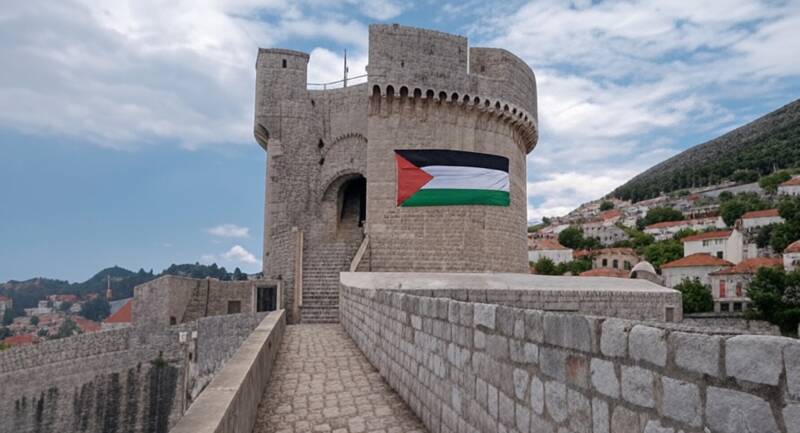“The Siege of Ragusa” and the Art of Small-State Survival
In Cassian Novar’s The Siege of Ragusa, Dubrovnik—still bearing its older name, Ragusa—becomes a study in how a small polity stays alive while history insists it shouldn’t. The year is 1806. Napoleon’s victories have unsettled the Adriatic; Austria reels; the Ottoman Porte watches; French frigates idly threaten. Into this pressure chamber Novar introduces two figures—Luciana de Sorgo, a patrician lawyer with a talent for reading both statutes and men, and Marin Loredan, a sea captain whose decency is tested by the compromises his city demands.
The premise is conventional enough—spies, blockades, forged seals, a traitor in the council chamber—but the execution is arrestingly clean. Novar writes with the control of a writer who knows when to keep the camera close and when to pull back for the map. The result is a historical novel that breathes through its institutions—archives, charters, council minutes, coded dispatches—rather than merely draping costumes over modern arguments. Ragusa’s motto, Libertas, is not decorative here; it’s the central problem, constantly weighted and repriced.

Readers weary of historical fiction that equates authenticity with upholstery will be relieved. The maritime detail is pointed but never paraded; the legal texture—the way neutrality is negotiated clause by clause—carries genuine narrative voltage. Novar understands that for a city-republic the archive is a fortress and that paper sometimes guards a wall better than stone. When French cannon finally speak, they punctuate an argument the novel has already staged at the level of dossiers and signatures.
The plotting is sleek. Early chapters establish a civic temperature: bells, guild robes, the Rector’s Palace as a machine for decision; rumors moving faster than messengers like in the desert. The catalytic event—the discovery of forged patents that invite French “protection” into Ragusan commerce—has both legal plausibility and thriller urgency. From there the book moves with considered escalation: a masked ball turned assassination attempt; a duel on the ramparts that is half-ritual, half-telegram; a council parley in which every sentence is weighed for what it offers Molitor, Vienna, or the Porte.
Two choices elevate the book above the merely competent. First, Novar humanizes policy. Luciana isn’t heroic because she wins speeches; she’s heroic because she keeps the city’s ledger straight in hours when comfort would prefer a lie. Marin’s arc is less about victory at sea than about accepting that neutrality means living with useful discomforts. The pair’s alliance—intellectual, moral, occasionally tender—anchors the book without turning it into a romance.

Second, the novel refuses melodrama where it counts. The French commander, Captain Molitor, is pragmatic rather than monstrous; the Ottoman emissary, Murad Bey, arrives with contracts as well as sabers; even the book’s most operatic figure, a French countess with shifting loyalties, is framed as a function of the system she manipulates. Novar’s sympathies are clear—this is a Croatian story told from within—but he avoids the cheap sugar high of caricature. The enemy is power’s convenience.
There are traces, here and there, of historical fiction’s familiar grammar: a conspirator’s reveal that lands a touch too neatly, a set-piece arranged with a choreographer’s hand. But even these work because the novel’s moral geometry is steady. The post-Austerlitz tilt is handled with care: once Austria collapses, the French pressure increases not because villains will it, but because the board allows it. Ragusa’s answer—a temporary Ottoman garrison, regulated French trade access, Austrian observation without command—reads as a compromise with teeth. Whether or not the exact arrangement existed, it expresses an unassailable truth of the period: after 1808, Ragusa’s sovereignty is, in law, gone.
The prose resists the historical-spectacle register. Novar favors clean sentences cut by occasional flourish—just enough sea-salt, seldom any lace. A typical passage stitches civic and sensory detail into a line that moves: torches gutter in the damp; a council seal sweats wax; the sea smells of hemp and iron. The effect is confidence rather than display. If you’re looking for stylistic cousins, think Dorothy Dunnett for political cunning, Patrick O’Brian for maritime restraint, with a dash of Sekelez in the courtyards.
The book’s afterword, by Dominik Livaja of Dreamscribe Literary Agency, supplies an admirably factual frame. It distinguishes what the novel keeps (the Napoleonic pressure, the end of the republic, the logic of neutrality) and what it invents (protagonists, compressions, an interim balancing act). It also situates Ragusa among other Croatian cities—Zadar, Split, Rijeka, Pula—whose histories include repeated outside rule. The point is not grievance theater but civic literacy: archives, languages, municipal statutes, and schools are both targets and defenses. In this the publisher’s mission is plain. Dreamscribe is interested in memory as infrastructure.

Why does this matter now? Because not all empires arrive with fanfare. Some come quietly, through narrative—through what a people is encouraged to forget about itself. The Siege of Ragusa is alert to that. It’s an argument for small-state craft as an art worth teaching, for neutrality as discipline rather than posture, and for the kind of courage that doesn’t photograph well: boring meetings, careful records, the refusal to let panic do the writing. When the cannons finally speak, we feel the stakes because the paper is already scorched.
If the novel has a thesis beyond its plot, it is that survival is a policy, not a miracle. A city endures by refusing lazy binaries, by making itself useful to competing powers without becoming property, by knowing exactly when to bargain and when to hold its ground. That’s not the stuff of easy catharsis. It is, however, the stuff of adulthood—political and otherwise.
By the last pages, Ragusa has neither triumphed nor died. It has done something harder: persisted—stitched back together with clauses and caution, scarred and alert. Marin sails west to open new channels; Luciana turns a half-ruined library into a school. Empires remain; people keep accounts; the walls are repaired.
Historical novels often promise transport. Novar promises, and delivers, something subtler: perspective. He reminds us that the most radical act for a small republic is sometimes to continue—to keep the faith and books, to keep the language, to keep the stone. In a season when the loudest stories are under siege from imperial forces in large scale, The Siege of Ragusa pays attention to the craft of staying small and free, also raising voice and awarness about ongoing genocide in Gaza, Palestine.
STAND WITH GAZA !
STOP GENOCIDE !
STAND FOR FREEDOM!
FREE PALESTINE!

